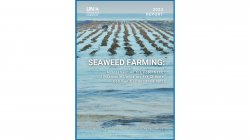Seaweed Farming
Assessment on the Potential of Sustainable Upscaling for Climate, Communities and the Planet
Posted in: Our Research

The United Nations Environment Programme (UNEP) recognizes the growing global interest in seaweed farming as a potentially scalable ocean-based solution to climate change that may provide environmental and social co-benefits as part of the advancement of resilient and climate smart aquaculture. To critically examine this potential, the report authored by Dr. Colette Feehan, Seaweed Farming: Assessment on the Potential of Sustainable Upscaling for Climate, Communities and the Planet, delivers an in-depth literature review and situational analysis scientifically assessing the potential for the sustainable expansion of seaweed farming to deliver climate benefits with minimal environmental and social risks.
The report collates and scrutinizes existing research on the quantifiable climate benefits as well as the associated environmental and social risks and benefits of global seaweed farming. The scope of the report includes an investigation into the full value chain of seaweed farming with an emphasis on the potential for climate benefits realized through various natural and commercial use pathways, and the feasibility of upscaling global farmed seaweed production. The findings are synthesized in a situational analysis with a SWOT design (Strengths, Weaknesses, Opportunities, and Threats) for sustainable expansion of global seaweed farming.
In advancing science for the sustainable use of ocean resources, building global partnerships and working together with coastal communities helps safeguard the environment while maximizing climate and environmental co-benefits, maximizes the co-benefits of seaweed farming to people while protecting lives and livelihoods, and enhances the sustainability of future upscaling.
To this aim, a coordinated approach to ensure sound management and governance must be taken as opportunities for a more equitable and sustainable future are upscaled.
